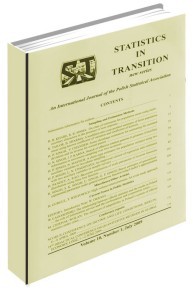SURVIVAL REGRESSION MODELS FOR SINGLE EVENTS AND COMPETING RISKS BASED ON PSEUDO-OBSERVATIONS
SURVIVAL REGRESSION MODELS FOR SINGLE EVENTS AND COMPETING RISKS BASED ON PSEUDO-OBSERVATIONS
Author(s): Ewa Wycinka, Tomasz JurkiewiczSubject(s): Economy
Published by: Główny Urząd Statystyczny
Keywords: generalised estimating equations; cumulative incidence function; probability of default; credit risk; survival analysis.
Summary/Abstract: Survival data is a special type of data that measures the time to an event of interest. The most important feature of survival data is the presence of censored observations. An observation is said to be right-censored if the time of the observation is, for some reason, shorter than the time to the event. If no censoring occurs in the data, standard statistical models can be used to analyse the data. Pseudo-observations can replace censored observations and thereby allow standard statistical models to be used. In this paper, a pseudo-observation approach was applied to single-event and competing-risks analysis, with special attention paid to the properties of the pseudo-observations. In the empirical part of the study, the use of regression models based on pseudo-observations in credit-risk assessment was investigated. Default, defined as a delay in payment, was considered to be the event of interest, while prepayment of credit was treated as a possible competing risk. Credits that neither default nor are prepaid during the follow-up were censored observations. Typical application characteristics of the credit and creditor were the covariates in the regression model. In a sample of retail credits provided by a Polish financial institution, regression models based on pseudo-observations were built for the single-event and competing-risks approaches. Estimates and discriminatory power of these models were compared to the Cox PH and Fine-Gray models.
Journal: Statistics in Transition. New Series
- Issue Year: 20/2019
- Issue No: 1
- Page Range: 171-188
- Page Count: 18
- Language: English

